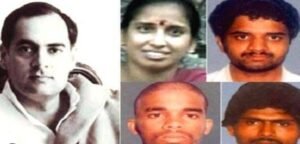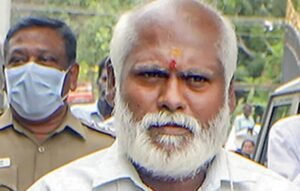On Tuesday, the Tamil Nadu government informed the Madras High Court that the Sri Lankan govt had issued travel documents on one of the convicts in the former Prime Minister’s assassination case, Santhan alias T Suthenthiraraja, along with others, who was released in 2022 as per Supreme Court’s order.

Background of the case
The former Prime Minister of India, Rajiv Gandhi was assassinated on May 21, 1991, in Kanchipuram’s Sriperumbudur town, Tamil Nadu. The assassination of Gandhi was carried out by Dhanu (the real name Kalaivani Rajaratnam), a suicide bomber linked to the Liberation Tigers of Tamil Eelam (LTTE), a Sri Lankan Tamil separatist group, along with Santhan and the other convicts.
However, this came after 1987, India’s intervention in the civil war between the Sri Lankan govt and the Tamil minority, seeking an independent state called Tamil Eelam, in which India deployed troops (IPKF) to support the Sri Lankan govt against LTTE (Liberation Tigers of Tamil Eelam) that lead to a reason behind the assassination of the leader.

Santhan’s involvement in the case
Santhan, also known as T Suthenthiraraja was a Sri Lankan national and an alleged member of LTTE, who along with other accomplices accused of betting and aiding Dhanu in the assassination plot, in which Santhan was allegedly procured the battery and other materials used in the bombing device.
Further, he was arrested by the Indian government, with evidence against Santhan that primarily includes witness testimonies and circumstantial details. Apart from this, it had created political tensions between India and Sri Lanka with an additional layer to the case’s interpretation.

Trial process and conviction
Santhan along with other accused, faced charges of conspiracy, aiding, procuring materials for the bomb, and abetting the assassination, went under a trial spanned several years by the TADA Act (Terrorist and Disruptive Activities (Prevention) Act), where the strict interrogation was conducted.
Moreover, the special TADA court found Santhan guilty and sentenced him to death in 1998. But he and other convicts appealed the verdict on the alleged violations during the trial and questioned the reliability of evidence, which the Supreme Court later commuted the death sentence to life imprisonment in 2014. But the court released the convict one year back which created lots of controversies.

Release and Controversy of the case
The Supreme Court of India, in November 2022, ordered to release of Santhan and the other convicts after 32 years of incarceration, citing a ‘procedural lapse’ that includes inadequate legal representation in the initial stage, limited access to legal documents, and violations of their rights under preventive detention laws.
Besides, the controversy sparked over the timing of the release which coincided with the Tamil Nadu assembly elections, fueled accusations of political motives. Also, the lack of clarity in the case created ambiguity and skepticism that added a layer of complexity. However, the Sri Lanka High Commission has requested the Tamil Nadu govt, to which the Ministry of External Affairs issued a temporary travel document. This information was submitted before the Bench of Justices Suresh Kumar and Kumaresh Babu of the Madras High Court by the state government.
Current Status
Santhan obtained travel documents valid until August 1, 2024, through a petition filed by him, but Sri Lanka issued these documents on February 13, 2024. However, the Indian govt is currently processing the necessary paperwork to authorize Santhan’s departure, as his return to Sri Lanka remains a controversial topic due to the sensitive nature of the assassination case. Also, he is undergoing treatment for liver ailment at Rajiv Gandhi Government Hospital, Chennai.












Comments 1